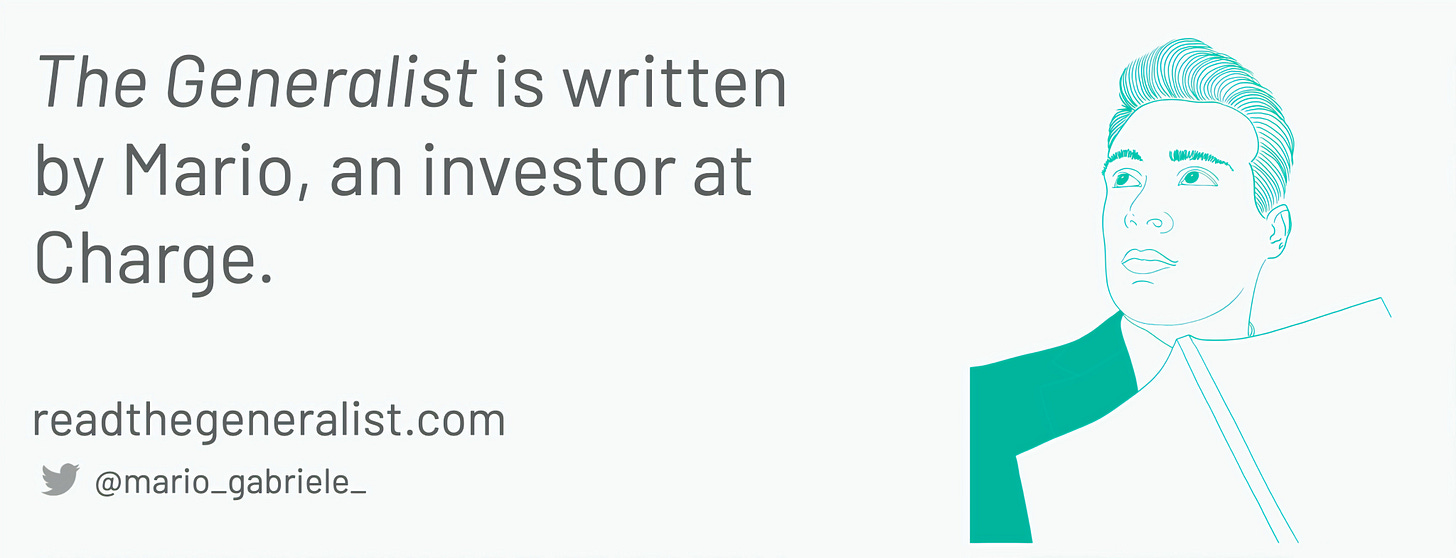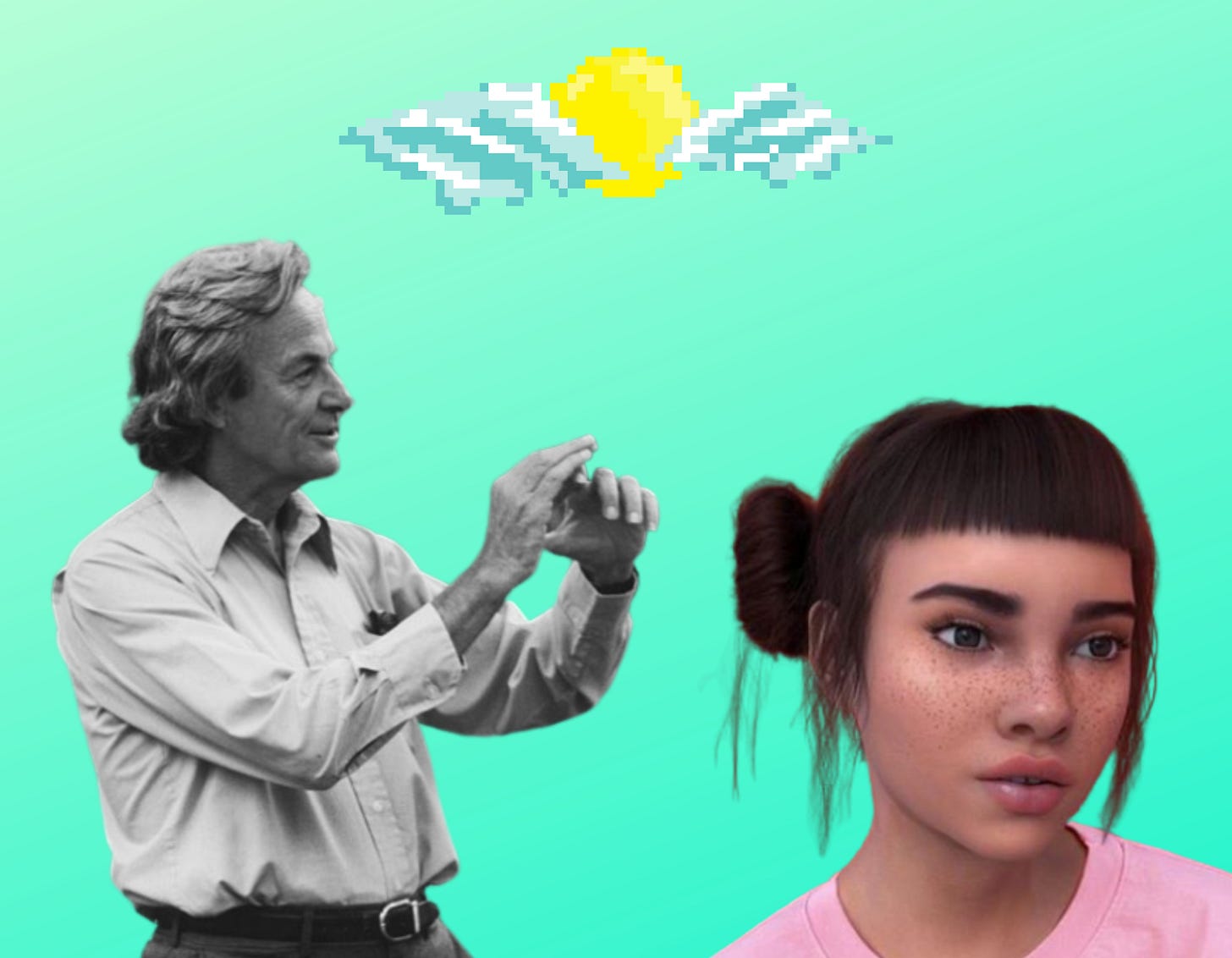
Editor's letter: The age of "Superstar" teachers is coming
Picture this:
It's 1989, and Michael Jordan's Bulls are in the dying moments of a fierce Game 5 with the Cleveland Cavaliers. With just two seconds left on the clock, Jordan scrambles across the hardwood, head faking to receive an inbound pass from Brad Sellers. Without so much as a half-second hesitation, he shifts his weight from right to left foot and scampers past Cav defender, Craig Ehlo. He sends a looping effort towards the basket. The buzzer sounds. A fraction of a second later, the ball caresses the net.
The greatest player of his generation, perhaps of all time, wheels away in celebration. But instead of a stadium in pandemonium, instead of millions of TV viewers catching their breath and punching their couch cushions, Jordan turns to a crowd of ten observers, each clapping politely and raising an occasional cheer amidst a depth of quiet.
For the world's best teachers, this is the reality. No matter how remarkably gifted they may be, no matter how central to society, they are producing brilliance before a paltry audience. In the decade that follows the coronavirus, we may consider the current state of affairs as absurd as "The Shot" ringing out across an empty coliseum, Lionel Messi waltzing through a hapless backline in a desolate Camp Nou, or Serena Williams rasping a cross-court forehand in a muffled Arthur Ashe.
Compared to athletes, it is not as if teachers have an easier road to dominance. On a numerical basis, teaching is often a more competitive field, though because it is not adversarial, elite performers are harder to ordain. Kenyan Peter Tabichi, winner of the annual "World's Best Teacher Award," faced steeper odds than world number ones in other disciplines. Tabichi had to beat out a reported 84.23MM teachers worldwide to earn his stripes, while Rory McIlroy, golf's number one, needed to best only 60MM global players. Novak Djokovic faced similar odds. For his abilities, McIlroy received annual compensation of $25MM, while Djokovic earned $50.3MM. Both were watched by millions. By contrast, Tabichi teaches a class of a few dozen, is likely to earn ~$18K, and gives 80% of his paycheck to community projects. This is no indictment of McIlroy, Djokovic, or other professional athletes — the market recognizes the value of their talent — as much as it is an observation of the dearth of celebrity educators.
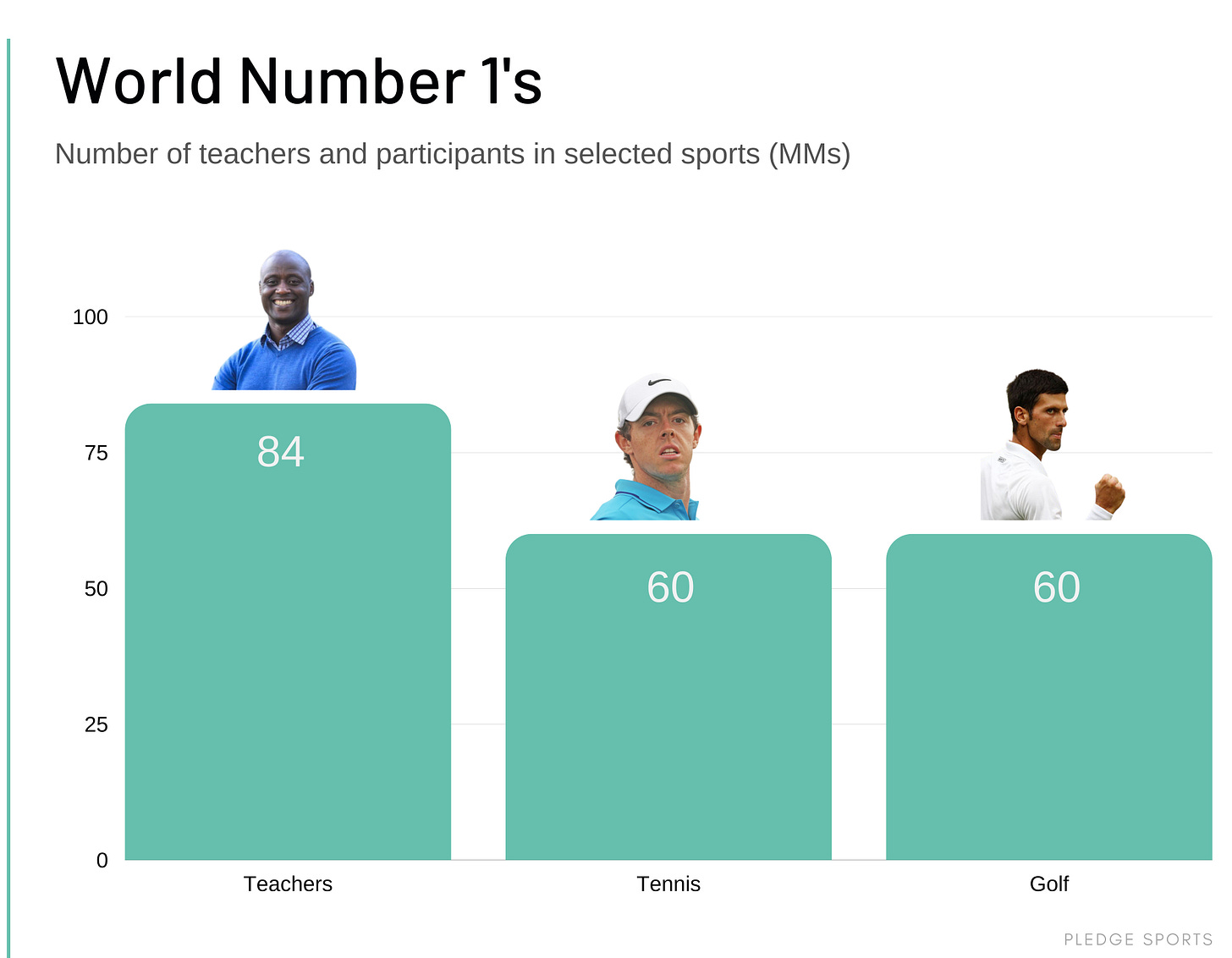
Sherwin Rosen's 1981 paper explains why exceptional teachers have been unable to profit from their abilities as effectively as other performance-based vocations. In "The Economics of Superstars," Rosen argues that the trend of fewer individuals earning larger amounts of money is driven by two elements: (1) the outstanding talent of the individual, and (2) an ability to share such talents with a larger market.
The latter point explains why the "Superstar Effect" has impacted teaching more weakly than other professions — teachers have been unable to expand their personal market. They are limited by the size of the class which they teach. Technology has changed things, of course, though not as dramatically as many predicted. Thinkpieces as early as 2003, heralded the inevitable arrival of "superstar" teachers aided by advances in technology: recordings of the best professors could be printed on CDs, and disseminated nationally. Khan Academy, Udemy, Udacity, and other online platforms, founded five or more years later, were expected to accelerate the trend thanks to the zero-marginal cost of serving more pupils online.
These platforms have created stars, though they are of a less lambent variety. Rob Percival, a former high-school teacher, earned $6.8MM through his web development course on Udemy as of 2016. Millions of hours had been spent reviewing his lessons. That would have been unachievable in his old job. With a traditional class size of 10 students attending 8 hours of tutelage, Percival would have had to teach for 68 years to log 2MM hours. Another case: in 2014, South Korean tutor Kim Ki-hoon was reported to have earned $4MM for his lessons in-person and on the Megastudy MOOC platform. An estimated 150K students watch his lessons online each year.
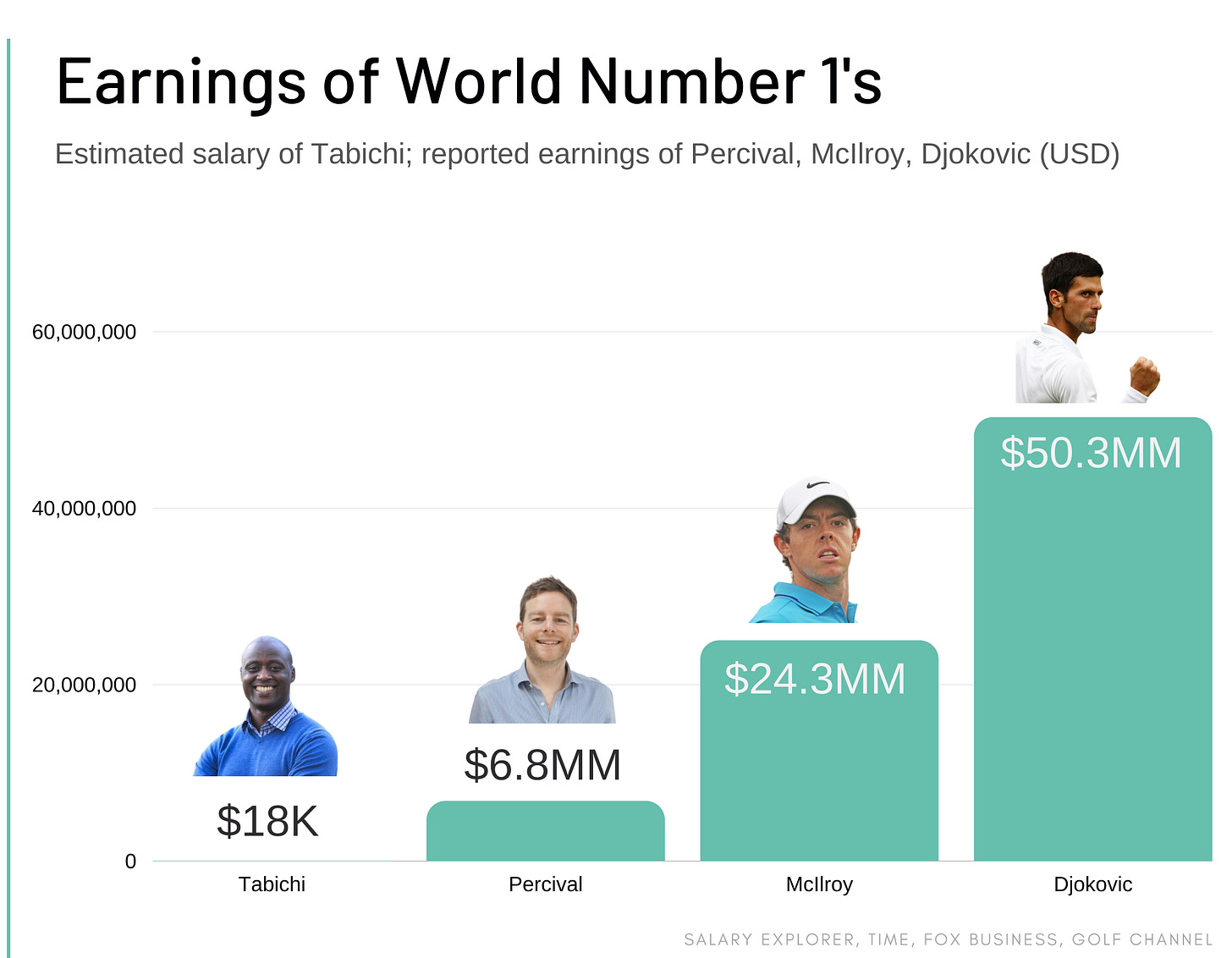
By all accounts, Percival and Ki-hoon are rich and influential men, but they do not touch the earnings or reach of other performers. Tiger Woods and Michael Jordan are both billionaires, while Cristiano Ronaldo is soccer's first addition to the three-comma-club. All have been cumulatively observed for billions of hours. In a decade, will we see a teacher achieve similar figures?
If that is to happen, the coronavirus may prove the impetus. While online learning is far from a niche segment, it is quickly attaining a ubiquity and range not see before lockdown. Most notably, it has shifted from luxury to necessity. Traditionally, the most popular courses online have been practical, geared towards adult learners looking to upskill. Sheltering-in-place has forced schools of all types to construct digital classrooms. At present, that mostly means a Zoom call. Over time, we may see different incarnations emerge.
How long will it take for children to return to in-person lessons? Six months? A year? And if it is sooner, how significant will inevitable interruptions be? Online learning has the opportunity to leap forward and fill the gaps. Leveraging digital platforms, popular teachers from the other side of the world may emerge as viable replacements for those down the street. If Peter Tabichi, the world's best teacher, offered daily science classes, would you pay $10/month for your child to attend?
No platform has been built for this use-case, a school as an approximation of the "Dream Team," the USA Olympic basketball squad that boasted Jordan, Bird, Ewing, Barkley, and Magic Johnson, among others. What would this look like for primary and secondary school teaching? Masterclass explores this premise but confuses status for pedagogical skill and production value for substance. (It also positions itself towards adults.)
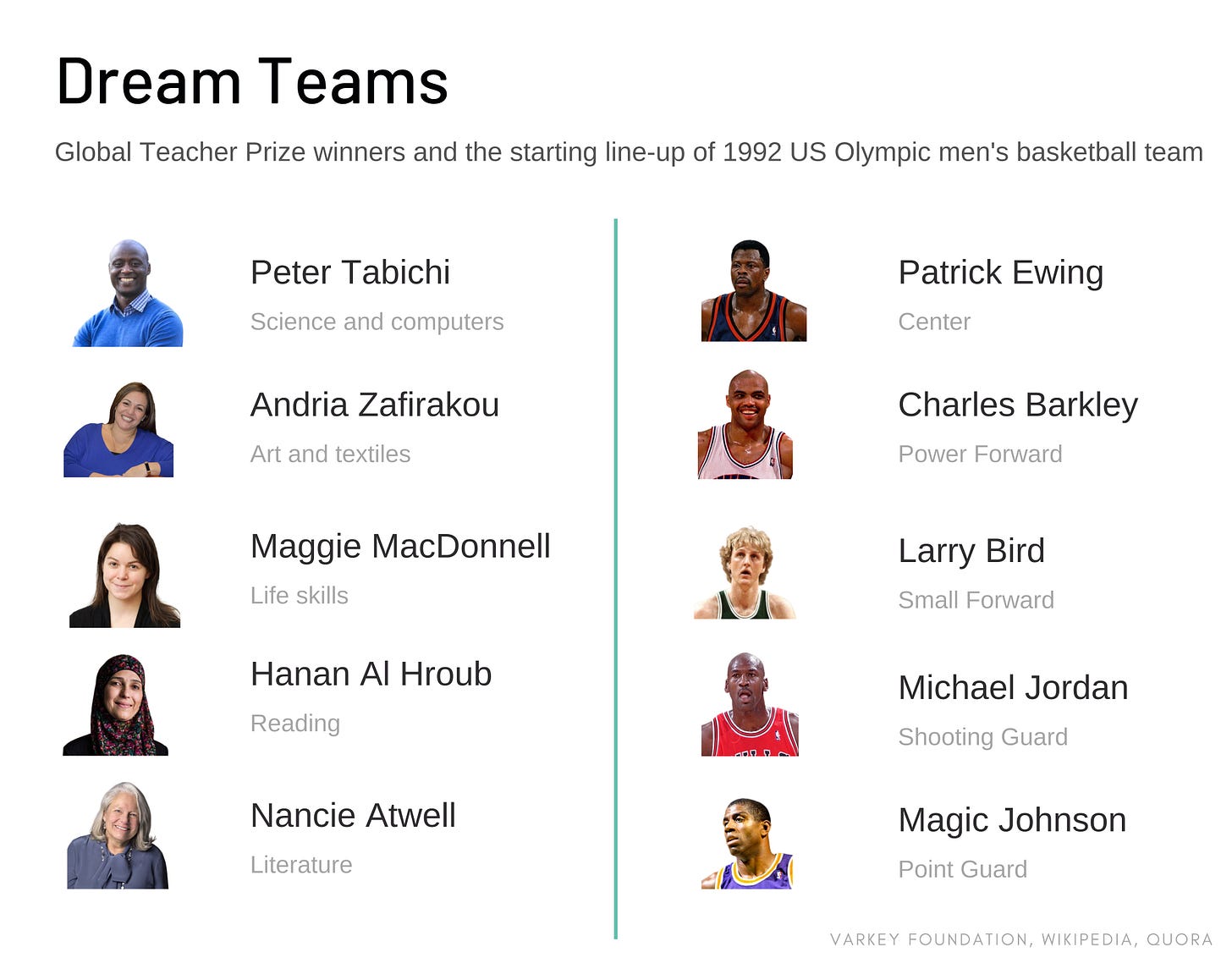
More radical models are easy to envision.
A full-stack solution could work with sufficient talent. At scale, this would create an axially different model, akin to the Professor-TA dynamic on steroids. A handful of elite teachers would serve as instructors, broadcasting lessons, while an army of TAs would serve as customer support, answering questions, and providing guidance. That alone would necessitate different systems: secure chat features, contingent teaching workforces, peer-to-peer collaboration systems, and partially automated grading.
In time, this could account for the importance of in-person lessons, integrating with micro-schools like Wonderschool and Prenda, or rolling out a lightweight franchise model itself.
What effect would this model of education have? If Acemoglu, Laibson, and List are to be believed, it would democratize access to high-quality teaching, as well as better compensating our most adept educators. In their paper "Equalizing Superstars," the researchers argue that though a "winner-takes-all" educational system presents problems of its own, it is likely to result in a broader distribution of superior teaching. Because of the opportunities presented in supporting elite practitioners, Acemoglu et al. also argued that "lower-skill" teachers would benefit, too.
Such a system might spawn compelling corporate rivalries. If we accept Scott Galloway's verdict that the Big Four will soon come for education, tantalized by the market size, could we see a battle for talent similar to that of the streaming wars? Will we one day open up the NYT and see Apple snatching up a 3rd grade English teacher for a sum that would make Joe Rogan blush? Key and Peele's "Teacher Draft" sketch may not be so far-fetched.
Finally, such a model may catalyze "synthetic teachers." If talent becomes the most expensive part of the equation and the greatest impediment to scalability, will companies look fabricate alternatives? We have seen Tupac resurrected, and Lil' Miquela animate before our eyes. The Brud concoction even conducted "live" interviews at last year's Coachella. Why not revive Richard Feynman with his knack for plain-talking analogies and infectious energy? Bill Gates once described the Nobel Prize winner as the "best teacher I never had," going so far as to create Project Tuva, a restoration of Feynman's best lecture. It is not difficult to imagine a more vivid and personal renovation that allowed a reborn Feynman to interact with students, undergirded by an AI-system similar to that leveraged by Luka.
Stadiums possess a magnetism, an energy, entirely their own. They are the most changeable of gathering grounds, capable of mutating from the raucousness of a rave to the hush of a cathedral in half a second. They are the home of glory and anguish, great pleasure and great pain. And perhaps, above all else, they are a place for appreciation. At its heart, that is the job of the spectator: to spend an hour or two enjoying, appreciating the gifts of the supremely talented. It is time we gave teachers, superstars in their own right, the chance to earn the praise their skill merits. It is time for them to take the field.
In other news...
The S-1 Club announced new contributors this week. Dave Ambrose, Tina He, Mengxi Lu, Byrne Hobart, Jon Hale, Tanay Jaipuria, and I will be turning our attention to Lemonade, the modern insurance broker. We also announced the first winners of the "Golden Graham," the prize awarded to the participant with the most accurate IPO predictions. Finally, we kicked off a group chat for the community on Public. It's been a lively discussion so far. There are a few places remaining. You can sign up by clicking the button below.
RFS 100 is growing quickly, surpassing 1K members in its first three weeks. This week featured ideas from an e-commerce founder, an EIR, and investors from Inspired Capital, Comcast Ventures, Story Ventures, and others. If you'd like to receive next week's edition, click the button below.
Brief
The "poet laureate of the gutter" on worthwhile pursuits
Surgeon robots and a new look for Mars
A crisis for the estate of Barry White
Citizen sleuthing flourishes in lockdown
The chaos of CRISPR
Robinhood's reckoning and Bytedance's banking bid
$15B! The story of Gaius the athlete
Jobs at Felicis, Electric, Cowboy, March, and Product Hunt
Ten winners brave the cold
Overheard
"If you're going to try, go all the way. Otherwise, don't even start. This could mean losing girlfriends, wives, relatives and maybe even your mind. It could mean not eating for three or four days. It could mean freezing on a park bench. It could mean jail. It could mean derision. It could mean mockery — isolation. Isolation is the gift. All the others are a test of your endurance, of how much you really want to do it. And, you'll do it, despite rejection and the worst odds. And it will be better than anything else you can imagine. If you're going to try, go all the way. There is no other feeling like that. You will be alone with the gods, and the nights will flame with fire. You will ride life straight to perfect laughter. It's the only good fight there is." — Charles Bukowski, Factotum
Good news
Striking back against anti-vaxx
A quarter of Americans would refuse a coronavirus vaccine because they believe it would contain a microchip, implanted at the behest of Bill Gates. That giddy supposition is one of many anti-vaxxer fabrications doing the rounds on social media. Since Covid began, anti-vaxx mentions have increased more than 2.5x. One public health official has a plan to combat the swarm of misinformation: fight fire with fire. With his new organization, Stronger, Dr. Joe Smyser has formed a coalition of pro-vaccination activists committed to reporting and responding to falsehoods encountered across the internet.
A suture from the future
Researchers from UC Berkeley created an AI model capable of stitching wounds. The benefit of such a solution is that frees overburdened surgeons from repetitive tasks, potentially improving outcomes by permitting physicians to focus on more critical cases. The model was trained through "imitation learning" — observing ~80 videos of suturing, paying particular attention to the insertion of the needle — rather than "reinforcement learning." The latter method encourages a model to self-educate via trial-and-error. Commenting on this decision, one researcher remarked, "The goal is that we start to move more towards natural forms of learning."
Mars is green
Is this good news? In a week awash with doom and gloom, the surprise of the Red Planet glowing green counts as a bright spot. New insights published in Nature Astronomy reveal Elon Musk's future home has a neon glow ringing its perimeter, much like earth. The phosphorescence shown below, captured by the ISS in 2011, is a consequence of the sun exciting the upper atmosphere's oxygen molecules. On the subject, you can help NASA's Mars Rover navigate more efficiently by labeling data for its AI system.
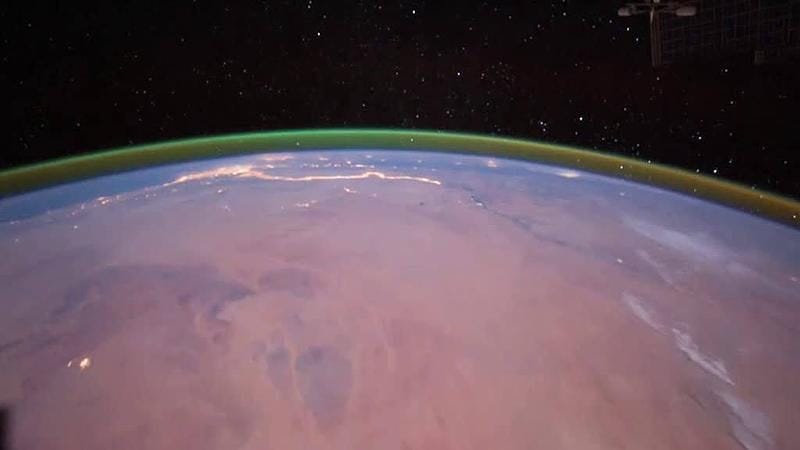
1000 words
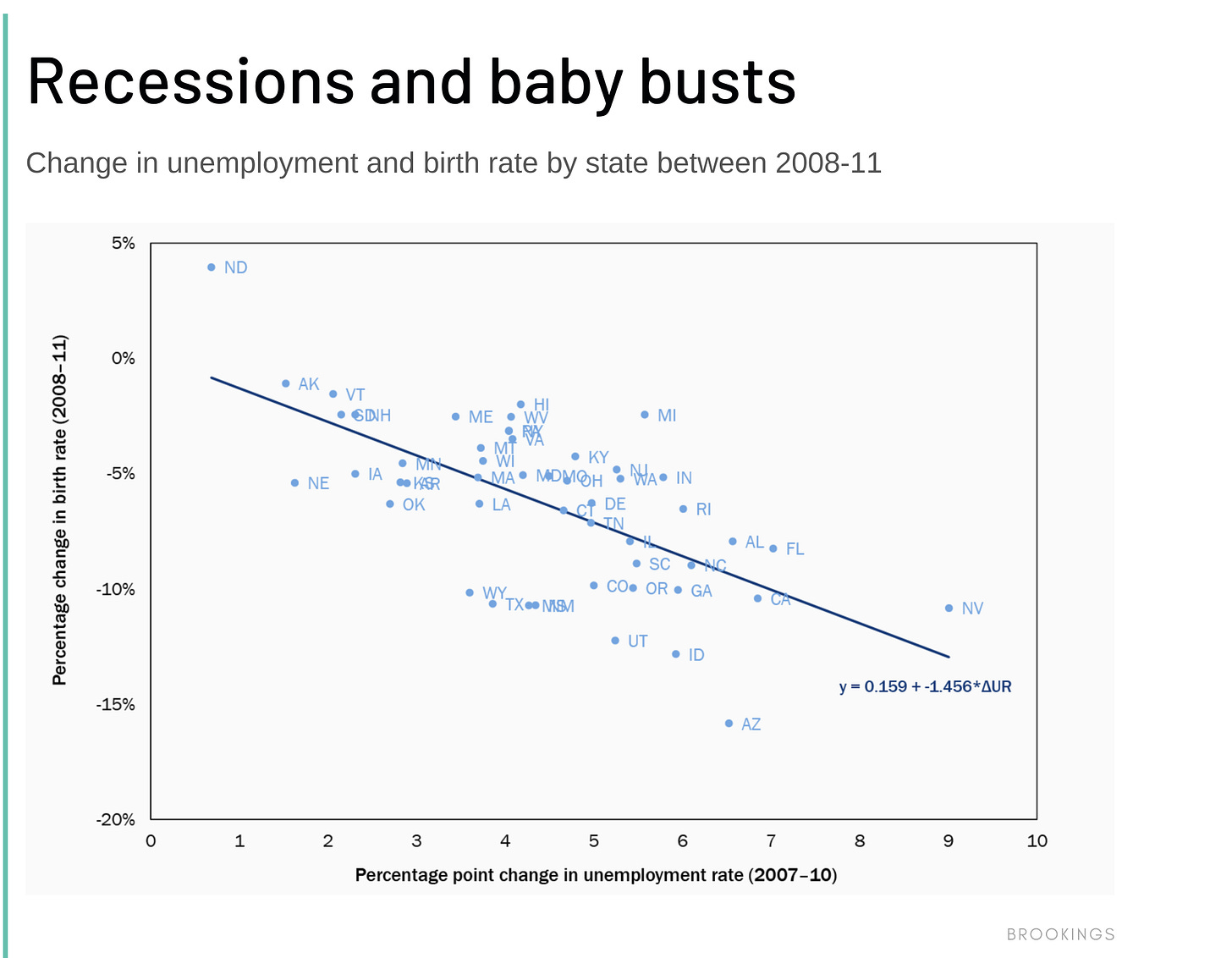
George Carlin's on children:
When I ask how old your toddler is, I don't need to hear '27 months.' 'He's two' will do just fine. He's not a cheese. And I didn't really care in the first place.”
If past trends hold true, fewer of us will be asking and answering such questions over the next year. Popular mythology suggests that when stuck in place — whether stranded in a snowstorm or huddling around a candle during a blackout — couples inevitably turn on the Barry White and "let love do its thing." That's led many to speculate that Covid-19 will produce a baby boom.
Not so fast, says the Brookings Institute. Data from blackout-induced conceptions doesn't hold up to scrutiny. And recessions have traditionally lead to a decline in birth rates. From 2008-11, for example, birth rates were inversely correlated with unemployment rates. As it turns out, economic hardship is not the most compelling aphrodisiac. As a result, the coronavirus is much more likely to create a baby bust rather than a boom. There may be as many as 500K fewer births in 2021.
Signal
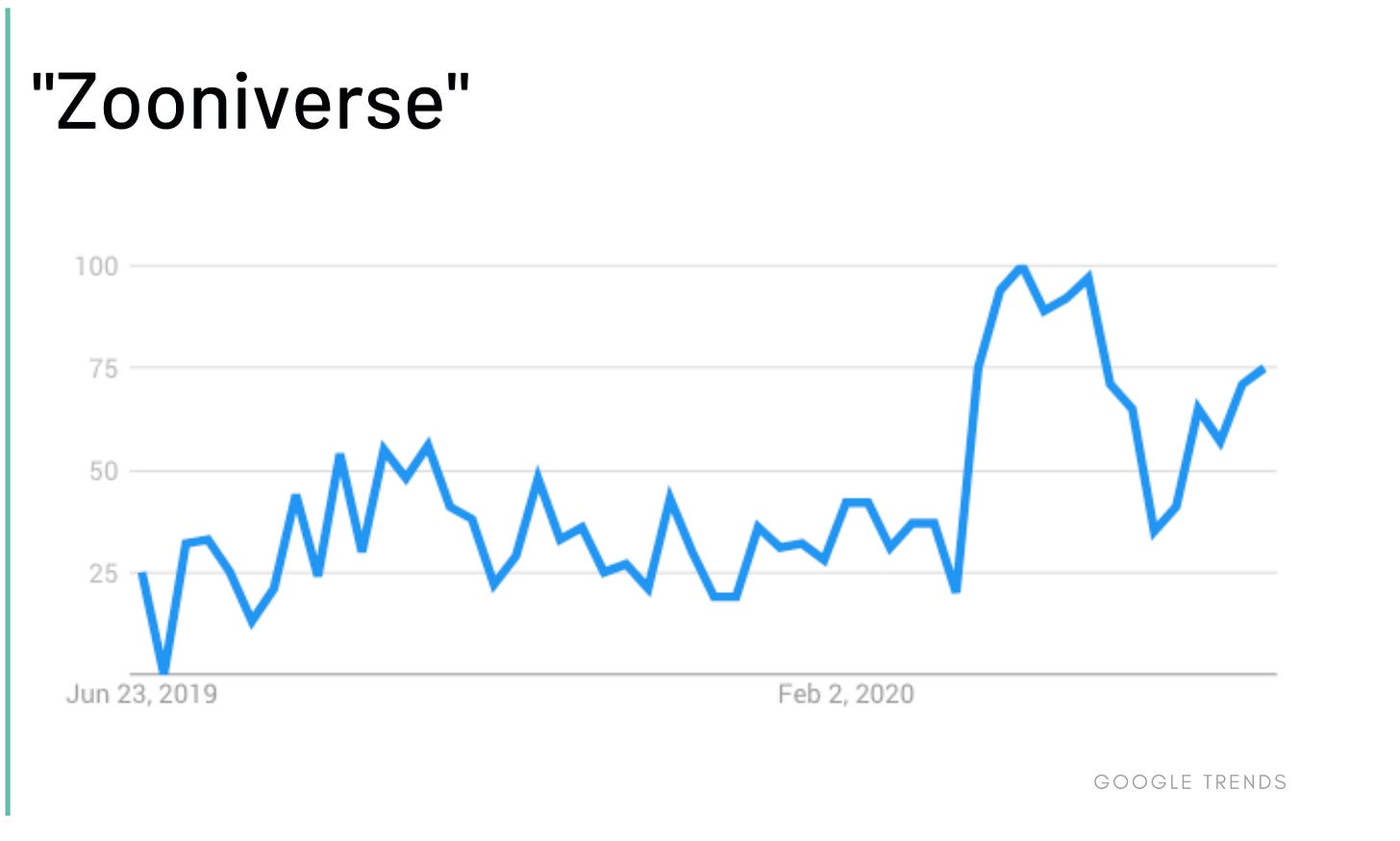
Lockdown has been a boon to "citizen science" platforms like Zooniverse. With time to kill, an increasing number of users are signing up to take part in massive collaborative projects that span industries. A few examples from Zooniverse:
Disk Detective: Review photos of stars and identify rings of gas, dust, and rock.
Notes from Nature: Transcribe data of grasshopper specimens to help the University of Michigan digitize its database of insects.
Star Notes: Create metadata and digitize 2,500 notebooks produced by female astronomers.
There are shadowier activities, too. Trace Labs, a Canadian non-profit, orchestrates teams of hackers to solve missing person cases. In 2019, the group found a previously unseen video of a missing person stepping into a car. Running the plates led to an address where the person in question was living. "Since the pandemic, we've seen an uptick in joins, the NGO's director noted.
Long tail
The secret life of Covid hairdressers
How much are you willing to risk for a clean fade? Cloak-and-dagger haircuts have emerged to serve those willing to take the risk. In London, seemingly shutdown barber shops freshen up clients behind closed doors. On Grindr, coiffeurs advertise their services with the scissor emoji. For some hairdressers, the risk is better than the alternative — bankruptcy. For others, it's become the new normal. "It doesn't even faze me," one noted, "Probably 80% of hairdressers are at it."
Some prioritize companionship over a fresh crop. "Long-distance" pets have become popular in India, with some services charging $40/month for video access to a pooch. More here
Summer might weaken the coronavirus. But even if that's the case, a second peak in winter will dwarf any short-term benefit. More here
Ctrl-Z
CRISPR is not ready for prime-time. Scientists in London, using the technique as part of a recent experiment, found that 44% of their sample embryos contained significant "unintended edits." To wit, in attempting to make one genetic edit, scientists accidentally made several others, an indictment of CRISPR's precision. "There's no sugarcoating this," UC Berkeley professor Dr. Urnov warned in light of the experiment, "This is a restraining order for all genome editors to stay the living daylights away from embryo editing."
Since 2017, China has undertaken a coordinated DNA drive, gathering blood samples from 700MM men. More here
Dexamethasone, a cheap steroid, reduces the death of coronavirus patients on ventilators by 1/3. More here
Forget the unintended consequences of CRISPR...what about the perils of dams? A series of academics debate "which technology has accidentally killed the most people?" More here
Margin calls
Robinhood faces a reckoning. The suicide of 20-year-old Alexander Kearns, who held a negative balance of $700K on the app, has prompted many to ask whether unsophisticated users should be given access to complex trading tools. As Kearns asked in his suicide note, "How was a 20-year-old with no income able to get assigned almost a million dollars' worth of leverage?"
Bytedance, the parent company of TikTok, bid for a banking license in Singapore. More here
Robinhood is not the only giant in hot water. Apple induced the scorn of David Heinemeier Hansson and Jason Fried, founders of new email service, Hey. More here
Detour
Not even Tiger Woods or Floyd Mayweather hold a candle to him. The wealthiest athlete of all-time is Gaius Appuleius Diocles, an illiterate roman chariot racer, who earned the equivalent of $15B in his day.
Born in 104 AD in Lamecum, now part of modern-day Portugal, Gaius was raised in relative comfort, beginning his racing career at the age of 18. In those days, Roman chariot racing was dominated by four "factions," organizations similar to modern racing teams.
Gaius began his career with the "Whites," earning his first victory after two years of competing. He earned the nickname "the Lamecus," in the process, a riff on his hometown, similar to being called "the New Yorker" or "Berliner." After an impressive six years, Gaius switched allegiances, joining the much more popular "Greens" faction, something of a powerhouse of the day. In a surprising move, however, Gaius changed factions again after three years, joining the much sleepier "Reds."
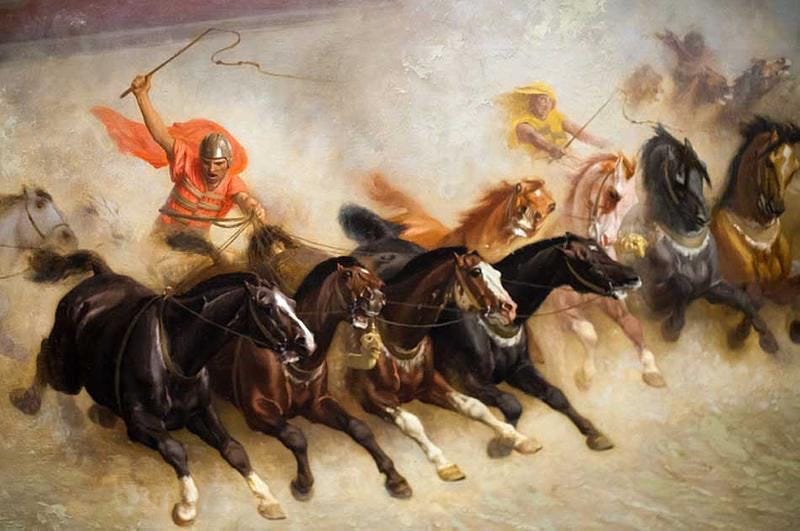
In many ways, this feels like a modern move: as part of the stacked "Greens," Gaius had fewer opportunities to stand out and build his legacy. With the less-vaunted "Reds," he was the inarguable star and compensated as such. For the next fifteen years, Gaius thrilled "Reds" supporters, becoming famous for a daring style, and a penchant for winning the highest-profile races in come-from-behind victories. As with his transfer between factions, this seems to have been another calculated move: though he was not the winningest racer (both Scorpus and Musclosus outdid him), he certainly had the largest purse, partially because of this decision to prioritize the most popular (and lucrative) contests.
That may have been part of the reason that Gaius raced for as long as he did. He retired aged 42 in a sport where many died in their 20s. He spent his later years in luxury with enough money to feed the city of Rome for a year or finance the entire Roman army for ~2.5 months.
Jobs
Director of Partnerships - Electric - NYC - Apply here
Investment Associate - Roivant - NYC - Apply here
VC Associate - Techstars - Boston - Apply here
Partner Operations - Felicis - SF - Apply here
VC Intern - Porsche Digital - SF - Apply here
Product Manager - NFX - SF - Apply here
Chief of Staff - Workday - SF - Apply here
VC Associate - March - LA - Apply here
VC Intern - Cowboy - Remote - Apply here
Product Manager - Product Hunt - Remote - Apply here
Puzzler
How many seconds are there in one year?
Fair warning: this is not a math problem. As always, clues given to those curious enough to message. All guesses welcomed, no matter how speculative.
Abhin S cruised down the red carpet and up the stairs to collect his gong week, just edging out a coterie of other winners. Terence F, Aya M, JEG, Violette Z, QVP, NMT, and Jimmy S all managed to deliver in response to last week's prompt:
I fly like a bird over land and sea. I am white but have no feathers. If you hold me, I will die. What am I?
The answer? Snow, or a snowflake. Both Matt W and Sajith P supplied another eminently plausible answer: clouds. Thoughtfully done, and congratulations to all ten.
Thank you for reading. If you enjoyed today's edition, consider sending it to the friend most likely show up in the clutch, like Gaius himself. Wishing you a restful end of the week. If you can, enjoy some sunshine. It's the longest day of the year, after all.
